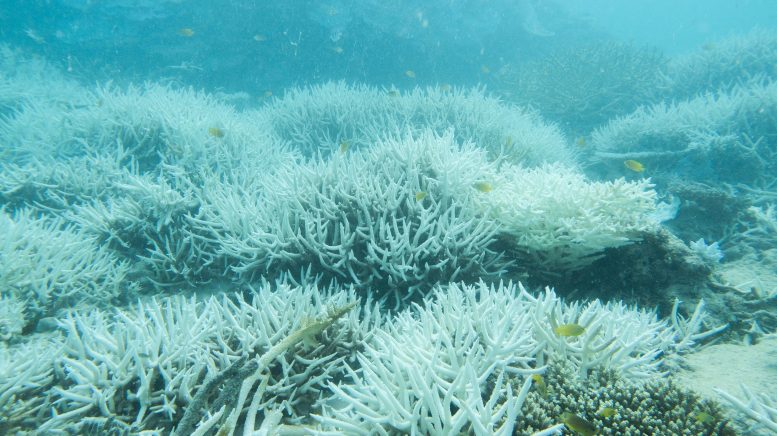
The Great Barrier Reef is experiencing devastating coral bleaching due to the highest sea temperatures in 400 years, driven by human-induced climate change, with scientists calling for urgent global action.
New research indicates the Great Barrier Reef is under critical pressure, with warming sea temperatures and mass coral bleaching events threatening to destroy the remarkable ecology, biodiversity, and beauty of the world’s largest coral reef. The study, led by University of Wollongong (UOW) Honorary Fellow and University of Melbourne Lecturer Dr. Benjamin Henley, provides new evidence of the impact that rising sea surface temperatures have had and will continue to have, on Australia’s ecological jewel.
Historical Context and UNESCO’s Response
The research reconstructs 400 years of summer sea surface temperatures in the Coral Sea. The results chronicle extreme recent ocean heat that has led to mass coral bleaching on the Great Barrier Reef.
Recently, UNESCO’s World Heritage Committee handed down its final decision on the state of the Great Barrier Reef, declining to list the Reef as in danger. However, the scientists have pushed back and say, based on their new evidence, the Great Barrier Reef is absolutely in danger.
The Impact of Climate Change on Ocean Temperatures
In the study, recently published in Nature, Henley and his team combined sea surface temperature reconstructions using geochemical data from coral cores previously collected from the region. They also analyzed climate model simulations of sea surface temperatures run with and without climate change, finding that human-caused climate change is to blame for the rising temperatures in the region.

Dire Warnings and Calls for Action
The recent mass bleaching events coincide with five of the six hottest years in the new 400-year-long record. In the years 2024, 2017, and 2020, the Coral Sea reached 400-year highs, with 2024 being the warmest on record by a large margin. The recent heat events in 2016, 2004, and 2022, were the next warmest three years on record. The impact on the Great Barrier Reef’s unparalleled ecology and biodiversity over repeated sequences of mass coral bleaching is devastating.
“When I plotted the 2024 data point, I had to triple check my calculations – it was off the charts – far above the previous record high in 2017. I could almost not believe it. Tragically, mass coral bleaching has occurred yet again this year,” Henley said.
“In the absence of rapid, coordinated, and ambitious global action to combat climate change, we will likely witness the demise of one of Earth’s most spectacular natural wonders.
“When you compile all of the evidence we have, it’s the inevitability of the impacts on the reef in the coming years that really gets to me.”

Professor Helen McGregor, from UOW’s Environmental Futures, who is the second author of the study, said urgent action is needed to prevent the devastation of one of the world’s most important ecosystems.
“There is no ‘if, but or maybe’—the ocean temperatures during these bleaching events are unprecedented in the past four centuries.
“The Great Barrier Reef is facing catastrophe if anthropogenic climate change is not immediately addressed. The very corals that have lived for hundreds of years and that gave us the data for our study are themselves under serious threat,” McGregor said.

Policy Implications and Future Prospects
“Our climate model analysis confirms that human influence on the climate system is responsible for the rapid warming in recent decades,” said Henley, who undertook most of the study as a post-doctoral researcher at UOW, where he is now an Honorary Fellow.
“Without urgent intervention, our iconic Great Barrier Reef is at risk of near-annual bleaching from high ocean temperatures. The Reef’s fundamental ecological integrity and outstanding universal value are at stake.
“We have many of the key solutions to stop climate change; what we need is a step change in the level of coordinated national and international action to transition to net zero.
“We can never lose hope. Every fraction of a degree of warming we avoid will lead to a better future for the human and natural systems of our planet.
“We hope that our study equips policymakers with more evidence to pursue deeper cuts in greenhouse gas emissions internationally.”
Understanding Coral Bleaching and Its Consequences
Coral bleaching occurs when stress causes the corals to expel the algae that live in their tissue. The algae give corals their vibrant colors and without them, the coral’s white skeleton is exposed. Stress from environmental disturbances and declining water quality can lead to bleaching, but recent warming in sea temperatures has led to bleaching on a mass scale. Corals can recover from bleaching events if the stress trigger, such as extreme ocean warming, is reduced for a significant period. The reef has experienced five major mass coral bleaching events since 2016.
Global Implications of the Study
While the Great Barrier Reef is the world’s largest coral reef system, the groundbreaking research has implications for coral reef systems throughout the world, highlighting the link between the long-term trajectory of extreme ocean temperatures and the ecological health and biodiversity of these complex and crucial ecosystems.
Researchers from Securing Antarctic’s Environmental Future, UOW, University of Melbourne, The University of Queensland, the Australian Institute of Marine Science, Tulane University (USA), and Columbia University (USA) contributed to the paper.
Reference: “Highest ocean heat in four centuries places Great Barrier Reef in danger” by Benjamin J. Henley, Helen V. McGregor, Andrew D. King, Ove Hoegh-Guldberg, Ariella K. Arzey, David J. Karoly, Janice M. Lough, Thomas M. DeCarlo and Braddock K. Linsley, 7 August 2024, Nature.
DOI: 10.1038/s41586-024-07672-x